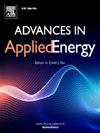Scalable spectrally selective solar cell for highly efficient photovoltaic thermal conversion
IF 13.8
Q1 ENERGY & FUELS
引用次数: 0
Abstract
Photovoltaic/thermal (PV/T) hybrid technology offers significant potential for carbon neutrality by simultaneously converting photons into electricity and heat simultaneously. However, the mismatch between PV/T output temperature and the temperature demand across a wide range of scenarios limits its practical uses. Traditional PV cells have high infrared emissivity, resulting in significant heat losses and seriously significantly hindering the development of PV/T systems. Spectrally selective solar cells characterized by high solar absorption, low thermal emission, and photoelectric conversion process, have yet to be realized thus far. In this study, we propose an integrated design and develop a scalable industrial approach for fabricating meter-scale spectrally selective solar cell with a high solar absorptivity of 92.3 % and a low infrared emissivity of 20.3 %, achieving the highest absorption-emission ratio of measured 4.6 experimentally. The primary novelty of the design lies in integrating the PV cell electrode atop and low-emissivity layer into one eliminating the need for rare metals and reducing complexity. Furthermore, we demonstrate that the spectrally selective PV/T significantly increases the overall solar efficiency from 13.7 % to 82.5 % and reduces the heat loss coefficient to 3.55 W/(m2.K). The validated model accurately captures the high photovoltaic thermal efficiency, enabling new technological advancements.
用于高效光电热转换的可扩展光谱选择性太阳能电池
光伏/热能(PV/T)混合技术通过同时将光子转化为电能和热能,为实现碳中和提供了巨大潜力。然而,光伏/热混合技术的输出温度与各种情况下的温度需求不匹配,限制了其实际应用。传统的光伏电池具有较高的红外发射率,导致大量的热损失,严重阻碍了光伏/发电系统的发展。光谱选择性太阳能电池具有高太阳吸收率、低热发射率和光电转换过程的特点,但迄今为止尚未实现。在本研究中,我们提出了一种集成设计,并开发了一种可扩展的工业方法,用于制造米级光谱选择性太阳能电池,该电池具有 92.3 % 的高太阳吸收率和 20.3 % 的低红外发射率,实验测得的最高吸收发射比为 4.6。该设计的主要创新之处在于将光伏电池电极和低发射率层合二为一,从而无需使用稀有金属并降低了复杂性。此外,我们还证明了光谱选择性 PV/T 可将整体太阳能效率从 13.7% 显著提高到 82.5%,并将热损失系数降低到 3.55 W/(m2.K)。经过验证的模型准确捕捉到了光伏的高热效率,实现了新的技术进步。
本文章由计算机程序翻译,如有差异,请以英文原文为准。
求助全文
约1分钟内获得全文
求助全文

 求助内容:
求助内容: 应助结果提醒方式:
应助结果提醒方式:


